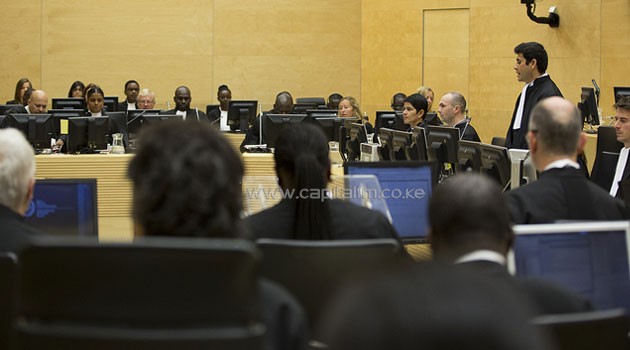
All parties, including the Attorney General, have an additional 14 days to make additional submissions in writing, in not more than 15 pages.
NAIROBI, Kenya, Feb 17 – The lawyer representing victims in the International Criminal Court (ICC) case against William Ruto and Joshua arap Sang argued before judges on Monday that Kenya can compel witnesses to testify, contrary to what Attorney General Githu Muigai said on Friday.
In a divergent legal opinion, Common Legal Representative for Victims Wilfred Nderitu said no Kenyan law prohibits the government from compelling witnesses to testify before the ICC and that in fact Section 11 of the International Crimes Act requires it to take action against those who seek to subvert justice by refusing to testify.
“A person who resists or wilfully obstructs an official of the ICC in the execution of his duty is guilty of an offence and liable to imprisonment for a term of no more than two years,” Nderitu told the court.
Both Ruto and Sang’s defence counsel however differed with Nderitu taking a stand similar to that of the Government of Kenya; that while it is required to issue summonses, it is not obligated to enforce them.
Karim Khan for Ruto and Katwa Kigen for Sang went on to argue that even if the witnesses made it into the precincts of the court, it has no power to force them to testify.
“There’s no penalty; there’s no power of arrest, even on these inviolable premises within ICC security. If such a witness was strong-armed, that would be an assault,” Khan argued.
Kigen also described the summonses as counter-productive given the witnesses the prosecution seeks to compel to testify had already recanted their statements.
Senior trial attorney Anton Steynberg however defended their request for summonses saying only three of the seven uncooperative witnesses had recanted their testimony and that it was possible that even those three could switch back to their statements to the prosecution when faced with the consequences of perjury.
“It may well be that in the solemn atmosphere of this courtroom, removed from any undue influence, they may well decide to say what we say is the truth,” he told the court, adding that the compelled testimony of the witnesses, who claimed to have been induced or coerced into signing up as prosecution witnesses, could end up benefiting the defence.
“Should any of the witnesses indeed fail to confirm their prior statements they may be questioned as to the reasons for this which would put the chamber in a far better position,” Steynberg submitted.
All parties, including the Attorney General, have an additional 14 days to make additional submissions in writing, in not more than 15 pages.









































